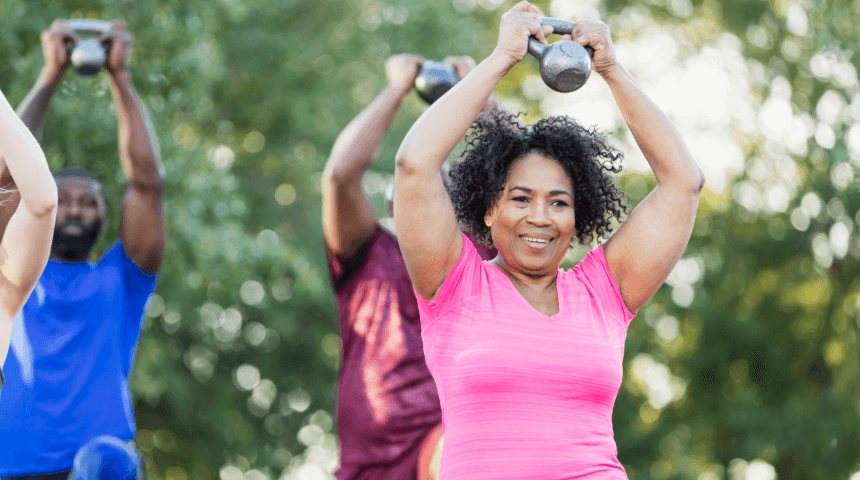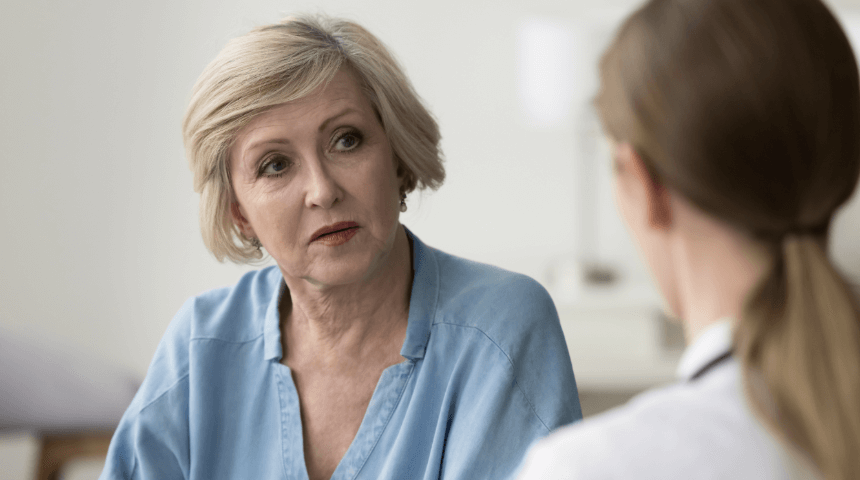Hot flashes. Runaway emotions. Weight gain. These are a few of the most familiar symptoms of menopause or perimenopause. But they’re not the only physical or emotional changes you need to know about as your reproductive system concludes its work and begins to shut down.
The First Signs
Perimenopause is the term for the time when your ovaries gradually stop working, statistically around age 47, meaning you’ll have less of the hormones estrogen and progesterone in your body. Hot flashes may begin, along with changes in muscle mass, vaginal dryness, energy levels, skin or hair.
This can also be a time of “confounding variables,” a cascading series of effects that build on one another —exhausted from sleepless nights of hot flashes, you’re too tired to exercise the next day. Working out less, you notice fat is being stored differently on your body. When fat accumulates more centrally, that can lead to heart disease, and it might feel like it’s harder to lose weight. If you’re not keeping up with resistance or weight training, you may actually be losing muscle mass because your testosterone values decline. (Yep, women have testosterone, too.) Muscles burn more calories than fat, so that also may make weight loss feel harder.
There’s also such a thing as “surgical menopause,” which can happen if you have a hysterectomy — a lot depends on whether your ovaries were removed along with your uterus. If both ovaries have been removed, that is considered surgical menopause. Even if just one ovary remains, a hysterectomy will not necessarily throw you into sudden menopause.
Sex and Menopause
Another change you may notice, especially during sexual intercourse, is vaginal dryness or the thinning of vaginal walls. Water- or silicone-based lubricants will help. (Don’t start with lubricants that have flavors or warming materials; those can be irritating when your tissue is thinner.) Are you in a monogamous relationship where infection is less of a concern? Cooking oil or coconut oil are good lubricants but may affect the integrity of condoms.
Dryness isn’t the only issue. More than a third of women report difficulties with sex during perimenopause and menopause. If sex is painful for whatever reason, that can affect interest in sex. Declining testosterone also affects sex drive. This is another example of those cascading variables: You’re tired. You don’t feel as attractive. Sex may be painful, but if you don’t keep your vagina “patent,” or open, with penetration by a penis or sex toy, the vagina can actually get smaller, making sex even more uncomfortable. If you don’t feel you can discuss these things with your partner, that also may affect sex drive. (Finding a healthcare provider you can talk with will help.)
Hormones or No?
There's been a lot of discussion in the last 20 years about the dangers of hormone replacement therapy — medications that deliver estrogen, progesterone or testosterone — but there may be good reasons to consider them. While the risks for some women can include cancer, stroke and blood clots, only you and your doctor can decide if those outweigh your risks from long-term sleep deprivation, poor decision-making and being just plain sad and miserable.
Those are some pretty scary choices, but it’s important to remember that not every woman experiences these symptoms. If you are not feeling great, speak up. Talk to your healthcare provider. There are non-hormonal strategies you should try first, if you have no contraindications.
Supplements can help, but they too come with concerns. If you have a history of breast cancer, plant-based estrogen might be a bad idea — talk with your oncologist first. Things like black cohosh are well studied and may help with hot flashes in some women but are not a good choice if you have liver issues. Flaxseed is another that may help, and red clover, but these claims are unproven. As with any over-the-counter supplements, these may not be FDA-regulated — so you won’t know if the black cohosh you got two months ago is the same as the black cohosh you’re buying today.
Accentuate the Positive
One of the biggest upsides to menopause is no more periods, a time when many women don’t feel great, month after month after month, for decades. There’s also no more worry about your period not coming, an equally important concern when 40 percent of pregnancies are unintended. Remember that perimenopause and menopause are a natural part of your journey as a woman. If your path proves to be a difficult one, your doctor is there to help.





